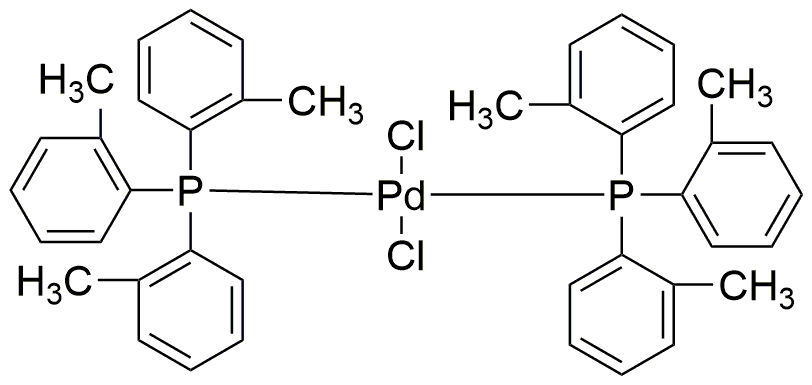Dichlorobis(tri-o-tolylphosphine)palladium(II) is widely utilized in research focused on:
- Catalysis in Organic Synthesis: This compound serves as a highly effective catalyst in various organic reactions, particularly in cross-coupling reactions like Suzuki and Heck reactions, which are essential for synthesizing complex organic molecules.
- Pharmaceutical Development: It plays a crucial role in the pharmaceutical industry for the development of new drugs, enabling the formation of carbon-carbon bonds that are vital in creating diverse medicinal compounds.
- Material Science: The compound is used in the production of advanced materials, including polymers and nanomaterials, enhancing their properties through effective polymerization processes.
- Environmental Chemistry: It has applications in environmental remediation, where it aids in the degradation of pollutants through catalytic processes, contributing to cleaner ecosystems.
- Research in Coordination Chemistry: This chemical is valuable in academic research, providing insights into coordination chemistry and the behavior of transition metal complexes, which can lead to the development of new materials and technologies.
General Information
Properties
Safety and Regulations
Applications
Dichlorobis(tri-o-tolylphosphine)palladium(II) is widely utilized in research focused on:
- Catalysis in Organic Synthesis: This compound serves as a highly effective catalyst in various organic reactions, particularly in cross-coupling reactions like Suzuki and Heck reactions, which are essential for synthesizing complex organic molecules.
- Pharmaceutical Development: It plays a crucial role in the pharmaceutical industry for the development of new drugs, enabling the formation of carbon-carbon bonds that are vital in creating diverse medicinal compounds.
- Material Science: The compound is used in the production of advanced materials, including polymers and nanomaterials, enhancing their properties through effective polymerization processes.
- Environmental Chemistry: It has applications in environmental remediation, where it aids in the degradation of pollutants through catalytic processes, contributing to cleaner ecosystems.
- Research in Coordination Chemistry: This chemical is valuable in academic research, providing insights into coordination chemistry and the behavior of transition metal complexes, which can lead to the development of new materials and technologies.
Documents
Safety Data Sheets (SDS)
The SDS provides comprehensive safety information on handling, storage, and disposal of the product.
Product Specification (PS)
The PS provides a comprehensive breakdown of the product’s properties, including chemical composition, physical state, purity, and storage requirements. It also details acceptable quality ranges and the product's intended applications.
Certificates of Analysis (COA)
Search for Certificates of Analysis (COA) by entering the products Lot Number. Lot and Batch Numbers can be found on a product’s label following the words ‘Lot’ or ‘Batch’.
Numéro de catalogue
Numéro de lot/série
Certificates Of Origin (COO)
This COO confirms the country where the product was manufactured, and also details the materials and components used in it and whether it is derived from natural, synthetic, or other specific sources. This certificate may be required for customs, trade, and regulatory compliance.
Numéro de catalogue
Numéro de lot/série
Safety Data Sheets (SDS)
The SDS provides comprehensive safety information on handling, storage, and disposal of the product.
DownloadProduct Specification (PS)
The PS provides a comprehensive breakdown of the product’s properties, including chemical composition, physical state, purity, and storage requirements. It also details acceptable quality ranges and the product's intended applications.
DownloadCertificates of Analysis (COA)
Search for Certificates of Analysis (COA) by entering the products Lot Number. Lot and Batch Numbers can be found on a product’s label following the words ‘Lot’ or ‘Batch’.
Numéro de catalogue
Numéro de lot/série
Certificates Of Origin (COO)
This COO confirms the country where the product was manufactured, and also details the materials and components used in it and whether it is derived from natural, synthetic, or other specific sources. This certificate may be required for customs, trade, and regulatory compliance.


